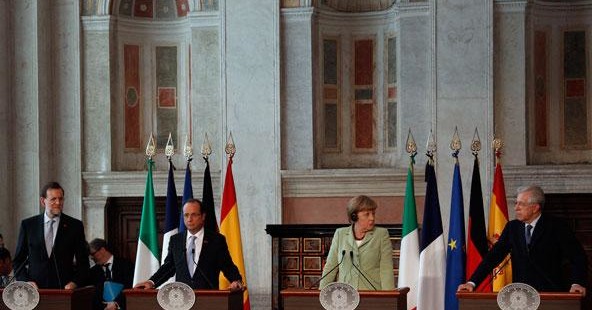
How the EU Got Its Mojo Back–19 Summits Later
LONDON— By my count it took 19 European Union summits since the Greek economy began to crack three years ago, but EU leaders have finally finished dithering. At the summit in Brussels last week, we can now look forward to a Europe that is safe for investors once again and significantly closer to making itself a single state.
The summit’s crucial session took 13 ½ hours, ending in the early hours of Friday morning. What came out of it were two things: Immediate relief for Spanish and Italian banks, which have been teetering near collapse in recent weeks, and the first steps toward a European banking union that will enjoy greatly enhanced supervisory and regulatory powers. In effect, Spanish or Greek banks will not be Spanish or Greek any longer; they will be European banks.
The principal details are these:
• Most immediately, Spanish and Italian banks—and others, for that matter—will enjoy direct access to Europe’s two bailout funds, the European Financial Stability Facility and the (new) European Stability Mechanism. This breaks a vicious circle. Previously, only governments could borrow from the rescue funds. This meant deeper sovereign debt every time Madrid or Rome or Lisbon borrowed to pull its banks out of trouble; it is a big reason Europe’s crisis has spiraled downward for so long and sent investors fleeing.
• The EU will create a new banking supervisory agency within six months. This is key to other new measures. It will take a big bite out of the sovereignty of Europe’s financial sectors, eventually leading to a European banking union. The European Central Bank will begin to look ever more like what its name implies—a Continent-wide monetary authority.
• In a move intended to draw investors back into the Spanish debt market, holders of new sovereign Spanish debt will no longer enjoy seniority over private creditors. This judgment singles out Spain, which is currently planning to borrow $100 billion to keep its banks afloat.
• The EFSF and the ESM may buy bonds from countries that meet current fiscal targets. This will drive down the unsustainable interest rates nations such as Italy and Spain are now paying to issue debt. At Germany’s insistence, the arrangement would also require EU supervision. An outstanding question concerns Italy: If the rescue funds are used to buy bonds, will they do so under less stringent conditions than are normal?
Even before the Brussels summit ended Friday it was clear the markets were satisfied that authentic steps had been taken. The share exchanges exploded. The euro surged 1.6 percent. Just as important, the yield on 10-year Spanish bonds plunged 41 basis points, to 6.5 percent. Two weeks ago, Spain was paying 7.29 percent for 10-year borrowings—an interest rate considered well into bailout territory.
I do not think Friday’s market activity will turn out to be another fickle, one-day bit of excitement. Too much of substance has been accomplished, even as most commentators and many investors were skeptical of anything at all getting done as late as Thursday evening. There will be no retreating from the banking union soon to be shaped. There will be only a going forward toward a fuller political union.
What made this deal possible after Europe has hung off a cliff by its fingernails for so long? It is the wrong question. The question is “Who?” And the answer is Germany’s chancellor, Angela Merkel.
Chancellor Merkel had a tough time in Brussels, as many had expected. She faced what we are now calling the Club Med—Spain, France, and Italy, all of whom wanted Germany to reduce its emphasis on austerity and embrace a “growth pact” worth $151 billion. A day before the summit, Merkel called the measure to provide immediate relief to Spain and Italy “eyewash and fake solutions.”
Then something unexpected happened. Spanish Prime Minister Mariano Rajoy and his Italian counterpart, Mario Monti, went on a kind of hunger strike: The two leaders refused to endorse the growth pact until the summit made clear that short-term financial relief would be endorsed. This forced Merkel’s hand, and she is now in political trouble at home—small wonder—for agreeing late Friday to the arrangements the EU has now passed.
We have to look at this two ways, both positive. First, the near term. Spain and Italy appear to have been saved from the bailout list. Everybody, from Beijing and Shanghai to Washington and New York, can now breathe a little more easily. The only question here is whether other EU members, such as Ireland, will now ask for similarly lenient terms on their debt. They should ask, and they should not be refused.
Second, Europe has now embarked on a 10-year plan that will fundamentally change what it means to be European. From last week’s summit will come pooled banking under a single authority, centralized fiscal and debt policies, and—far from least—a European political federation.
The most immediate step to be taken concerns theEuropean Central Bank. We have yet to see how it will react to the Brussels summit. The big question—watch for it in coming days—is whether the ECB will, in response to Brussels, begin to signal a new definition of its role with a set of less rigid, more liberal and flexible, policies.

